Understanding the Power of ABA in Developing Resilience and Perseverance
Applied Behavior Analysis (ABA) is a widely recognized, evidence-based intervention that considerably influences the emotional and social development of children with autism. Its structured, behavioral approach not only addresses specific behavioral challenges but also plays a vital role in nurturing resilience and perseverance—key skills for long-term success and well-being. This article explores how ABA therapy supports these crucial qualities, highlighting strategies, outcomes, and the scientific underpinnings that make ABA an effective tool for building emotional strength in children.
The Role of ABA in Developing Adaptive Skills and Emotional Regulation
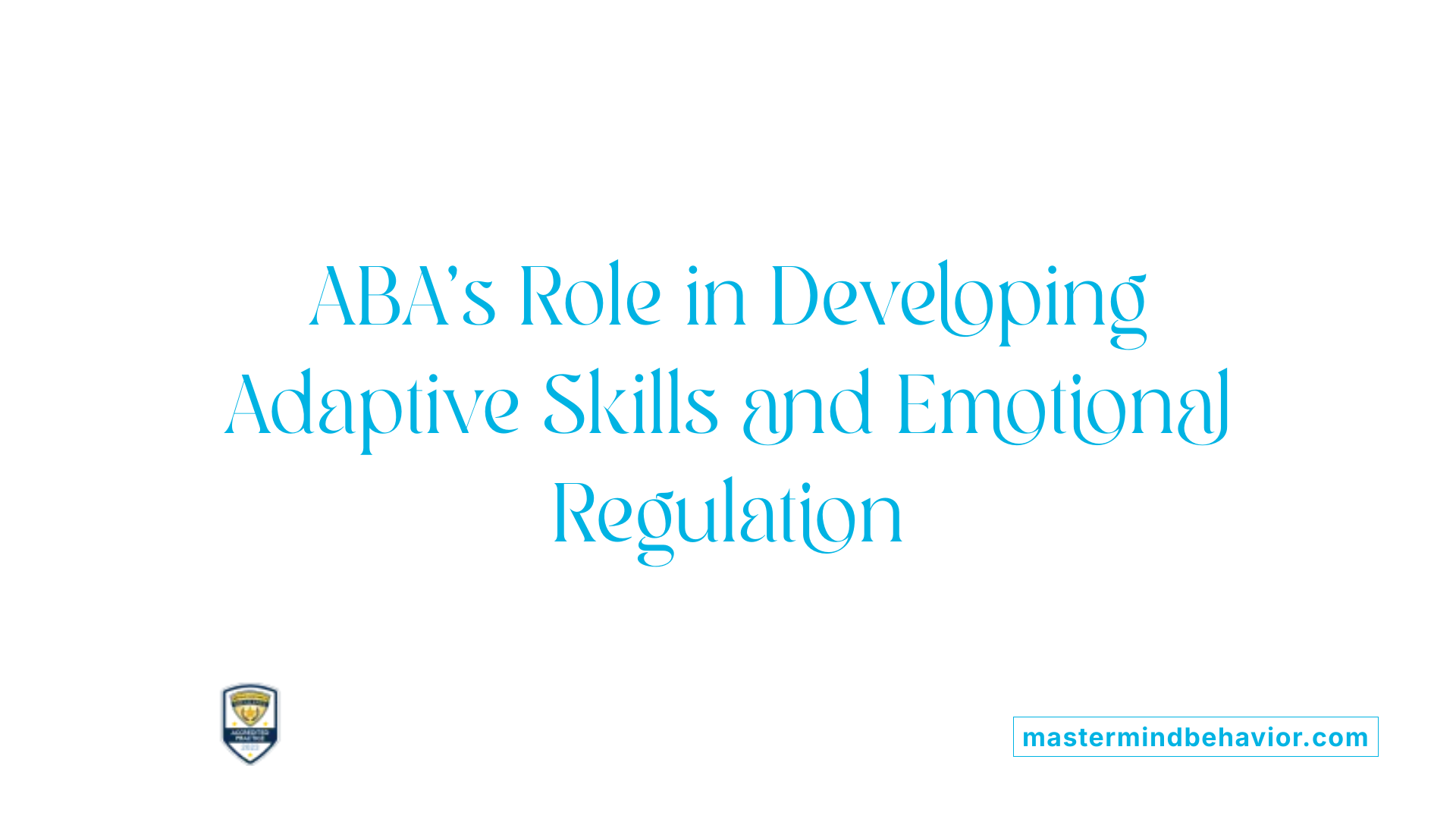
How does ABA therapy contribute to the development of resilience and perseverance from an educational perspective?
ABA therapy plays a significant role in fostering resilience and perseverance in children with autism by focusing on developing essential adaptive skills and emotional regulation. Through structured teaching methods, ABA breaks complex challenges into manageable steps, enabling children to experience success gradually. This approach helps build confidence, encouraging children to persist when faced with difficulties.
Teachers and therapists frequently use positive reinforcement to motivate and reinforce effort, which nurtures a growth mindset. Techniques such as discrete trial training and naturalistic environment teaching are designed to promote skill acquisition in real-world contexts, helping children adapt, cope with frustrations, and manage their emotions better.
In addition, ABA incorporates social skills development and goal-setting activities that promote adaptability to new situations and interactions. By practicing these skills in a consistent, supportive setting, children learn to handle change and setbacks constructively.
The structured and evidence-based methods of ABA not only teach practical skills but also empower children with the resilience needed to navigate various challenges in educational and social environments. This comprehensive approach supports their overall perseverance, supporting long-term success and well-being.
Techniques and Strategies That Foster Perseverance and Emotional Strength
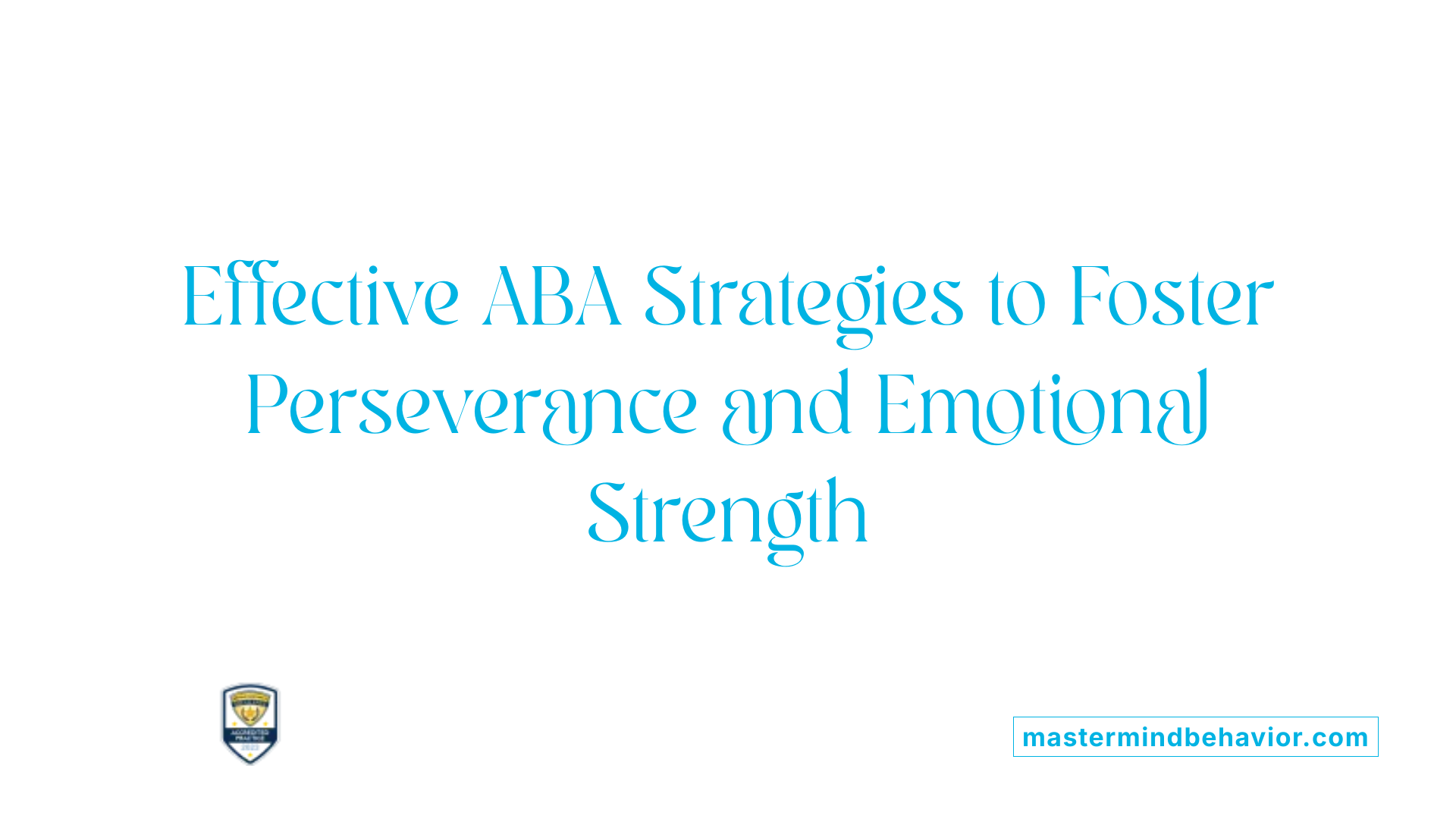
What strategies and techniques are used in ABA therapy to foster resilience, perseverance, and emotional coping skills?
ABA therapy employs a variety of practical strategies to help children develop resilience and emotional strength. Positive reinforcement is fundamental; it encourages children to repeat desired behaviors by rewarding effort and success, which builds confidence. Social skills training, including role-playing and visual supports, improves communication and interaction skills, making social challenges more manageable.
Functional behavior analysis helps identify the reasons behind behaviors and craft tailored interventions. Building skills like cognitive flexibility through mindfulness exercises, teaching children to adapt to change, reduces frustration. Establishing hierarchical goals allows children to experience success at different levels, promoting persistence.
Consistency across therapy sessions, collaboration among therapists, parents, and community resources ensures that skills are transferred into everyday life. Celebrating small wins reinforces progress, fosters motivation, and normalizes setbacks as learning opportunities.
Supporting emotional resilience also involves helping children understand and express emotions by validating their feelings. Teaching coping skills such as deep breathing, progressive muscle relaxation, and visualization equips children to manage stress.
Parental involvement is essential. Active participation and training enable parents to reinforce skills at home, creating a supportive environment that nurtures independence and persistence. Recognizing setbacks as opportunities for growth and adjusting expectations help children develop a growth mindset, which sustains perseverance even when faced with difficulties.
In summary, ABA incorporates reinforcement, skill-building, and emotional support techniques designed to encourage perseverance, resilience, and emotional regulation, leading to more adaptive and confident individuals.
Supporting Emotional Resilience and Reducing Anxiety
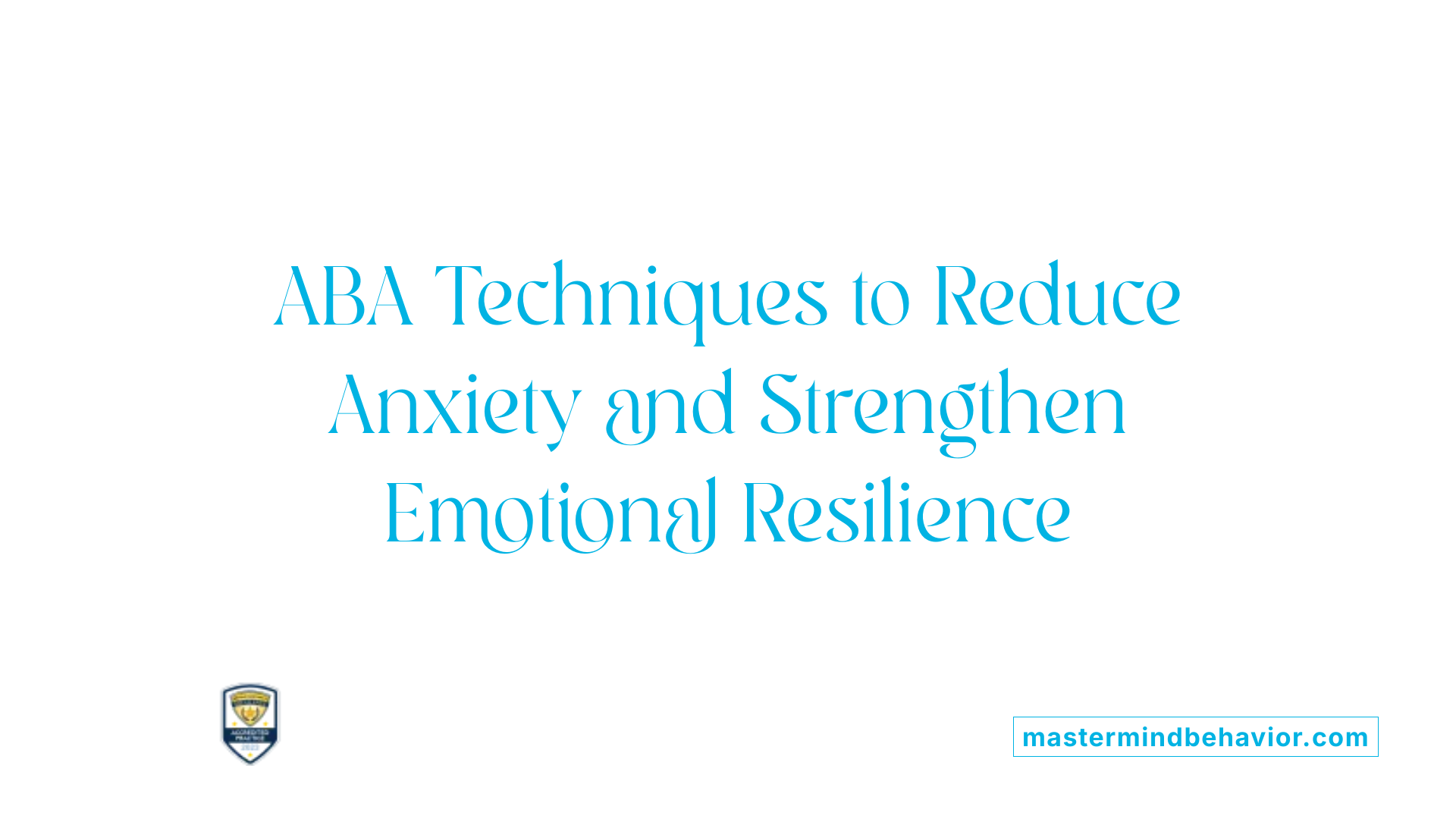
How does ABA therapy help manage anxiety and support emotional resilience?
ABA therapy plays a significant role in helping children with autism manage anxiety and develop resilience. It uses a broad range of behavioral techniques tailored to each child's needs. These include visual supports, calming strategies, sensory-friendly environments, and coping skills such as deep breathing.
Visual supports, like picture schedules and social stories, aid children in understanding routines and what to expect, reducing uncertainty that often triggers anxiety. Consistent routines combined with flexibility allow children to feel secure while adapting to changes gradually, strengthening their resilience.
Calming techniques—such as deep breathing, progressive muscle relaxation, and visualization—are integrated into therapy sessions to help children self-regulate during stressful moments. Creating sensory-friendly environments minimizes overwhelming stimuli, promoting comfort and emotional safety.
Coping strategies like deep breathing practice empower children to control their responses, decreasing anxiety levels over time. ABA also incorporates principles from therapies like Acceptance and Commitment Therapy (ACT), which enhance psychological flexibility, helping children accept their emotions and face challenges with greater resilience.
Furthermore, ABA emphasizes positive reinforcement to encourage the use of these coping skills and builds children’s confidence in handling difficult situations. Reinforcing effort, celebrating small successes, and focusing on strengths foster emotional strength and self-esteem.
In summary, ABA supports emotional resilience by teaching children to recognize and regulate their emotions, use calming tools, and adapt to changing circumstances. These strategies help children develop healthier responses to anxiety-provoking situations, making it easier to manage stress and persevere through challenges.
Building Resilience in Children with Severe Behaviors Through ABA
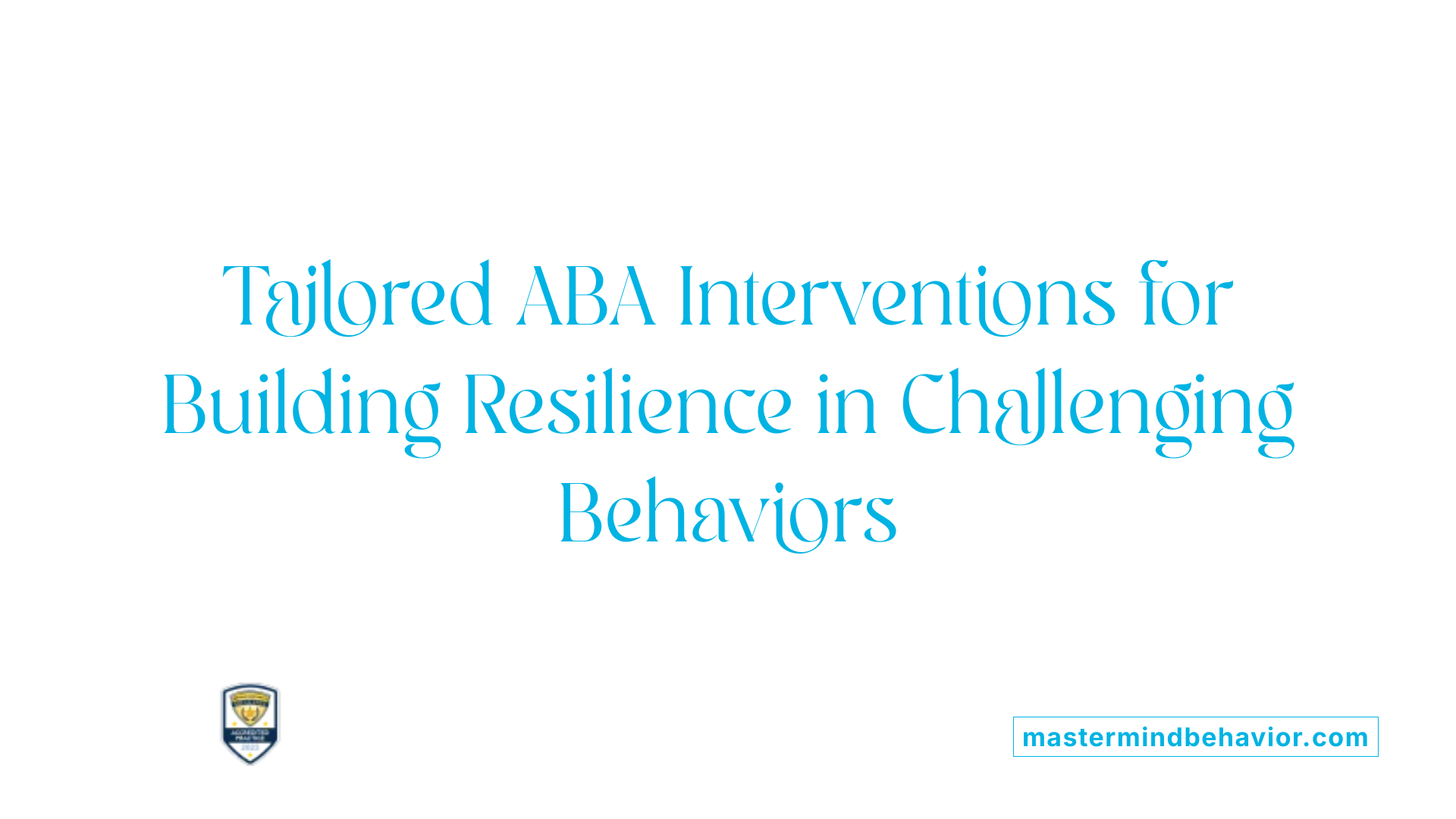
How does ABA tailor interventions to support resilience?
Applied Behavior Analysis (ABA) creates personalized treatment plans that target each child's unique needs. Therapists assess individual behaviors and develop strategies to reinforce positive actions while gradually decreasing challenging behaviors. This customization helps children build confidence as they experience success in manageable steps, fostering perseverance.
How does ABA address challenging behaviors?
ABA employs evidence-based techniques like reinforcement, visual supports, and functional behavior assessments to understand and modify severe behaviors. By breaking down complex behaviors into simpler parts and teaching alternative, adaptive responses, children learn to manage their emotions and reactions. Over time, this reduces behaviors that hinder resilience and encourages healthier coping strategies.
In what ways does ABA promote the development of adaptive skills?
Through structured routines, prompting, and sensory-friendly environments, ABA helps children develop essential life skills. These include emotional regulation, problem-solving, and independence in daily tasks. Reinforcing effort and celebrating small successes bolster a child's belief in their abilities, directly contributing to stronger resilience.
How does ABA teach communication to support perseverance?
Effective communication is vital for resilience. ABA uses social skills groups, role-playing, visual supports, and teaching strategies for initiating conversations. Improving communication reduces frustration, builds social confidence, and encourages children to persist in social interactions despite difficulties.
Summary Table
| Aspect | Techniques Used | Purpose | Additional Notes |
|---|---|---|---|
| Tailored interventions | Behavior assessments, personalized goals | Builds confidence and perseverance | Adjusted to child's learning style |
| Addressing behaviors | Functional behavior assessment, visual supports | Reduces severe behaviors | Enhances emotional regulation |
| Developing skills | Routine creation, prompting | Fosters independence and resilience | Focus on strengths |
| Teaching communication | Role-playing, social stories | Supports social perseverance | Aids in emotional and social growth |
Effective ABA therapy combines these strategies to empower children with severe behaviors, helping them become more resilient and perseverant in daily life.
Enhancing Mental Health and Emotional Development
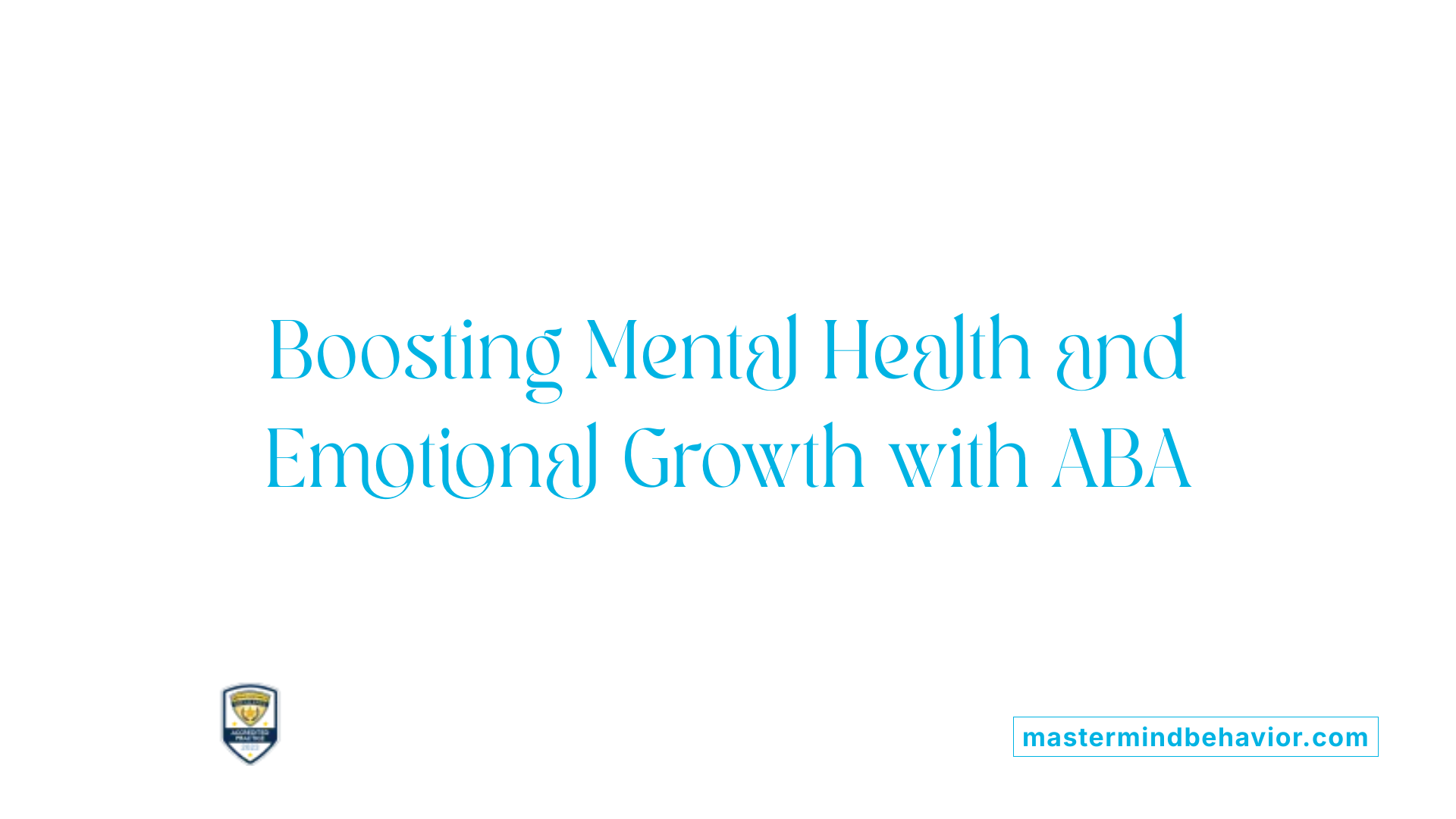
How does ABA therapy influence mental health and emotional development related to resilience and perseverance?
ABA therapy plays a vital role in shaping emotional health and fostering resilience in children with autism. By focusing on tailoring interventions to meet each child's unique needs, ABA helps improve emotional regulation, which is crucial for developing resilience. Techniques like visual supports, calming strategies, and creating sensory-friendly environments enable children to better manage stress and emotional outbursts.
Furthermore, ABA encourages the development of coping skills such as problem-solving, relaxation techniques, and engaging in activities of interest. These skills help children face challenges with confidence and persistence. The use of positive reinforcement reinforces efforts and successes, motivating children to persevere even in difficult situations.
Combining ABA with mental health approaches such as Cognitive Behavioral Therapy (CBT), Dialectical Behavior Therapy (DBT), and Acceptance and Commitment Therapy (ACT) enhances emotional resilience. These strategies promote mindfulness, emotional acceptance, and behavioral activation, helping children understand and tolerate difficult emotions without becoming overwhelmed.
Family involvement is essential for reinforcing these skills at home, ensuring consistency, and supporting ongoing emotional growth. Regular monitoring and adjustments to therapy plans keep children progressing toward increased independence and emotional strength.
Overall, ABA creates a comprehensive framework that promotes emotional well-being, resilience, and persistent effort through personalized interventions that foster self-esteem, emotional regulation, and perseverance.
Scientific Evidence Supporting ABA’s Effectiveness in Building Resilience
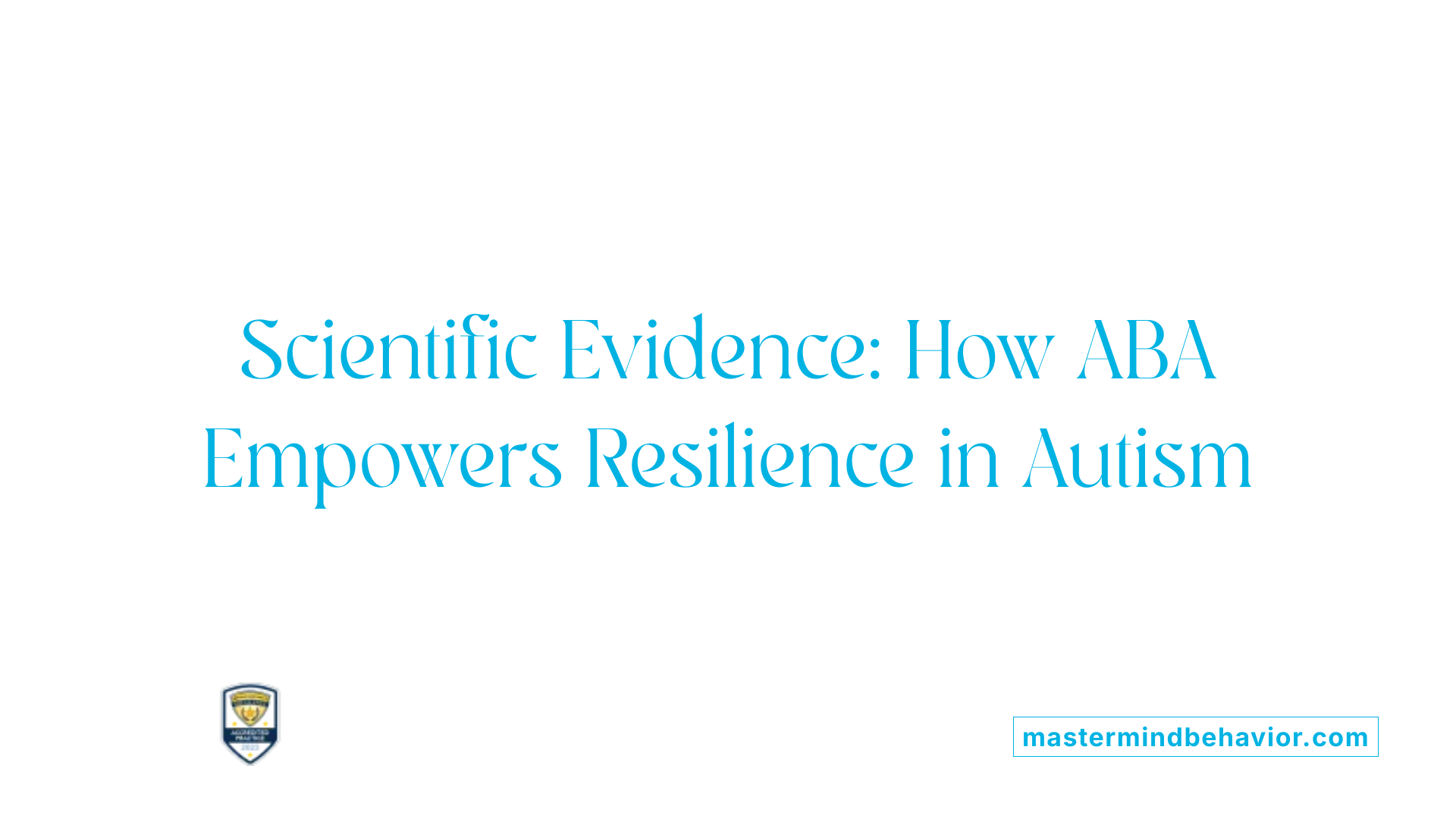 Research findings consistently show that Applied Behavior Analysis (ABA) therapy significantly enhances resilience in children with autism. Through targeted interventions, ABA promotes improvements in behavioral, emotional, and social skills, which are vital components of resilience.
Research findings consistently show that Applied Behavior Analysis (ABA) therapy significantly enhances resilience in children with autism. Through targeted interventions, ABA promotes improvements in behavioral, emotional, and social skills, which are vital components of resilience.
Studies demonstrate that children engaging in ABA often develop better emotional regulation, social engagement, and independence. These outcomes align with resilience theory, which emphasizes the importance of coping skills, social support, and positive outlooks for overcoming challenges.
ABA strategies, such as breaking challenges into manageable steps and reinforcing perseverance, directly contribute to fostering resilience. Reinforcement of effort and success encourages children to persist despite difficulties, nurturing grit and adaptive problem-solving.
Neurobiological research provides further support, linking perseverance and emotional resilience to brain regions responsible for self-control, goal-setting, and emotional regulation. ABA’s focus on skill development may influence these neural pathways, enhancing a child's capacity for perseverance.
Empirical data underline the effectiveness of ABA in achieving positive behavioral and emotional outcomes. Many studies report decreased maladaptive behaviors and increased social communication, which support resilience and perseverance in real-world settings.
In summary, scientifically supported evidence suggests that ABA therapy not only addresses core developmental challenges but also builds the foundational skills necessary for resilience. This includes promoting emotional strength, social competence, and perseverance, leading to improved long-term adaptive functioning in children with autism.
Harnessing ABA for Lasting Emotional Strength
The effectiveness of ABA therapy in fostering resilience and perseverance is well-supported by scientific research and practical applications. By emphasizing individualized, structured interventions, ABA helps children develop emotional regulation, social skills, and adaptive behaviors. With active parental involvement and a focus on positive reinforcement, children learn to face challenges with confidence and persistence. As children internalize these skills, they gain independence and emotional strength, reducing anxiety and enhancing overall mental health. Ultimately, ABA's holistic approach equips children with the resilience and perseverance necessary to thrive in diverse environments, laying a foundation for a resilient, adaptive future.
References
- Building Resilience At Home: Everyday ABA Techniques That ...
- Building Resilience in Children with Autism - Childwise ABA
- ABA Therapy for Managing Anxiety in Children in Atlanta
- Build Resilience and Perseverance In Young Children | Famly
- Expert Q&A: How ABA therapy can help with severe behaviors
- Benefits Of Combining ABA And Occupational Therapy For Autistic ...
- Uncovering The Power Of ABA Therapy Techniques For Building ...
- The Psychological Effects of ABA Therapy on Children
- Applied Behavioral Analysis (ABA) Therapists in Lakewood, OH
- Should I Enroll My Child in ABA Therapy? A Guide for Parents








